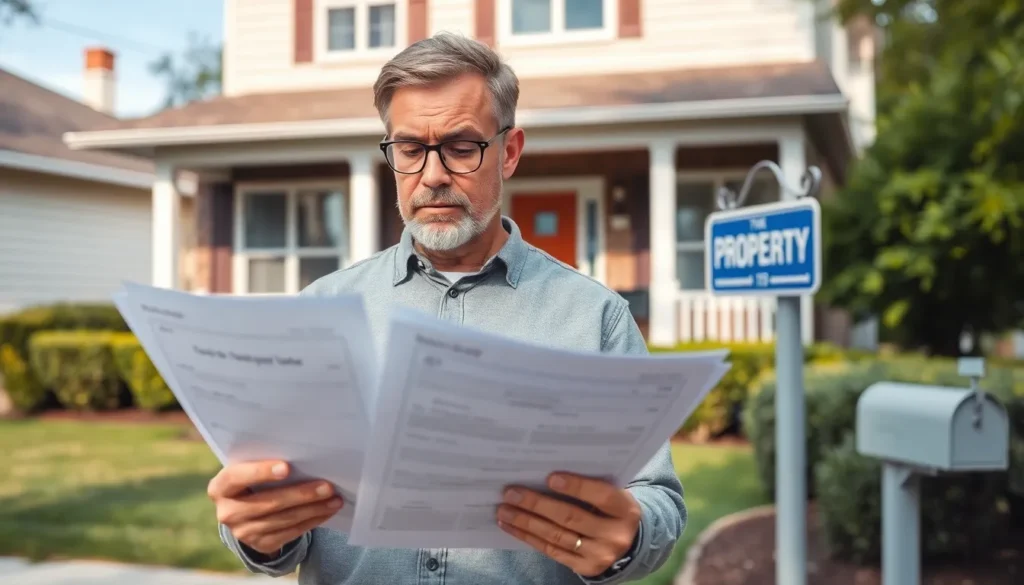Table of Contents
ToggleCounty property taxes might sound as exciting as watching paint dry, but they play a crucial role in funding local services that keep communities running smoothly. From schools to road maintenance, these taxes ensure that essential services don’t go belly up. But let’s face it, nobody enjoys seeing that bill pop up in the mailbox, right?
Understanding how county property taxes work can feel like deciphering a foreign language. But fear not! With a little knowledge, taxpayers can navigate this maze without losing their sanity—or their wallets. Dive into the world of property taxes and discover how to make the most of your investment while keeping your sense of humor intact. After all, who knew taxes could be so enlightening?
Understanding County Property Taxes
County property taxes serve as a crucial funding source for local services. These taxes enable communities to maintain necessary infrastructure and support key programs.
Definition of County Property Taxes
County property taxes represent a levy imposed on real estate properties within a specific county. Tax authorities assess property values to determine taxable amounts. Local governments utilize these assessments to calculate annual tax bills. Property owners contribute to this tax based on assessed value and applicable rates. Understanding these fundamentals helps taxpayers grasp their financial responsibilities.
Importance of County Property Taxes
County property taxes play a vital role in financing essential services. They support public schools, law enforcement, emergency services, and road maintenance. Communities rely on these revenues to ensure stability and growth. Without proper funding, quality of life and public safety could decline. Property taxes allow for planning and investment in local infrastructure, benefiting all residents.
How County Property Taxes Are Calculated

County property taxes rely on property assessments and various influential factors. Understanding these elements allows taxpayers to better anticipate their financial responsibilities.
Assessment Process
Tax authorities assess property values annually or biennially. Officials consider the size, location, and condition of the property during the evaluation. Additionally, comparable property sales in the area contribute to determining value. After assessing properties, tax authorities multiply the assessed value by the local tax rate to establish the total tax bill. Transparency in this process ensures that property owners comprehend how their tax bills are derived.
Factors Influencing Property Value
Several factors significantly influence property value. Economic trends, neighborhood demand, and property improvements play crucial roles. Proximity to schools, amenities, and public transportation often enhances property desirability. Local economic conditions such as employment rates can also affect values considerably. Lastly, potential zoning changes may alter the assessment scope by impacting development opportunities in the area. Understanding these factors aids taxpayers in making informed decisions regarding their properties.
The Impact of County Property Taxes
County property taxes significantly influence homeowners and local communities. These taxes provide essential funding for public services and infrastructure, impacting daily life.
On Homeowners
Homeowners often feel the direct effects of county property taxes in their budgets. Tax bills reflect property values determined by assessments, which can fluctuate yearly. Increased assessments may lead to higher tax obligations, affecting financial planning. Taxpayers can appeal assessments if they believe their property values are overstated. Understanding how tax rates are calculated helps homeowners prepare for potential increases. Maintaining properties and making improvements can positively impact value, thus influencing tax responsibilities.
On Local Communities
Local communities depend heavily on revenue generated from county property taxes. Schools, emergency services, and road maintenance receive necessary funding from these taxes. Communities with robust tax bases can offer better services, enhancing overall quality of life. Engaged citizens contribute to discussions about tax rates, promoting accountability and transparency. Local governments utilize funds to address residents’ needs, fostering economic growth and community development. Well-managed property tax systems also attract new businesses looking for supportive environments.
Strategies for Managing County Property Taxes
Taxpayers can implement several strategies to effectively manage county property taxes. Successfully navigating this landscape involves careful financial planning and awareness of available options.
Budgeting for Property Taxes
Setting aside funds for property taxes helps prevent financial strain. Individuals can create a dedicated savings account for these expenses. Estimating annual property tax amounts based on the previous year’s bills aids in budgeting. It’s beneficial to review property tax assessments to identify any potential increases, allowing early adjustments. Incorporating property taxes into monthly budgeting ensures funds are available when bills arrive. This proactive approach helps maintain financial stability and keeps taxpayers prepared.
Seeking Tax Relief Options
Exploring tax relief options provides valuable assistance to those struggling with property taxes. Many counties offer programs that reduce tax burdens based on income, age, or disability status. Property tax exemptions for veterans and low-income homeowners further alleviate financial pressure. Additionally, investigating local initiatives may reveal temporary payment plans during economic hardship. Engaging with county tax offices often reveals unseen opportunities for relief. Recognizing eligibility criteria helps homeowners take advantage of available resources, easing financial responsibilities.
County property taxes play a crucial role in sustaining local services and infrastructure. By understanding the assessment process and factors influencing property values, taxpayers can better manage their financial obligations. Engaging with county tax offices and exploring relief options can ease the burden for many. Ultimately, informed citizens contribute to a more transparent and accountable tax system, fostering community growth and stability. Embracing knowledge about property taxes not only empowers individuals but also enhances the overall quality of life for everyone in the community.







